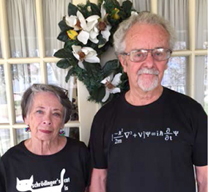

“My legacy will be the minds I molded; not the papers I wrote or the prizes I won.”— Ward Plummer
Plummer on the Great Wall
This year has been a “crazy journey”. My tutor, Ward Plummer, who was also my good friend, passed away peacefully while sitting in a rocking chair on his doorstep, leaving me so many memories and much nostalgia. In recent years, he had been rushing about trying to build a Spherical Aberration-Corrected Electron Microscope in his university, and he worked to the end: on the morning of his death he missed a discussion on exactly that topic.
I remember our first meeting in the autumn of 2000. It was his first visit to Beijing, and he appeared as the chief adviser at the founding ceremony of the International Center for Quantum Structure, Institute of Physics, Chinese Academy of Sciences.
The meeting gathered the top young Chinese scientists in the field of surface physics. Ward particularly appreciated the scholars he met at that event. He still wondered many years later how CAS could develop so many outstanding young physicists.
A group photo of Plummer and Chinese physicists, and a poster wishing him a happy birthday.
I was a graduate student at the time. I accompanied him and his wife on a visit to Beijing as a volunteer. They were full of curiosity and open-minded toward everything in China: the couple bought a duck-shaped chopstick rack after dinner and watched ordinary people quarrel in a hutong; they happily learned to rip steamed bread with their hands and ate it in soup; they ate dumplings and then knocked back the soup in the bowl; they squeezed into a narrow taxi which could only be found in China at that time, and enjoyed their sightseeing zipping through the streets.
We didn’t eat fish until I found that he liked it very much at the dinner before he went back to the United States. I explained that “foreigners” are usually pricked by fish bones, so I dared not give it to him. He smiled, saying: “You know what, I earned my college tuition on my father’s fishing boat.”
This also laid the foundation for us to dine at Lapopo Restaurant and enjoyed chuanchuan (vegetables and meat skewers served in hot and spicy broth) and beer in the Wangjing area of Beijing. Later, when Ward came to China to meet with us, he took out an envelope full of paper money and announced “It’s my treat today”, which is very Chinese.
In 2001, I went to his laboratory to do my postdoctoral research, and what impressed me was his insight into the details of the experiment. I remember that when I met with difficulties and turned to him after fiddling around by myself for a long time, he always looked at the results and shook his head, then pointed out the problem directly. In my later research, I found that his knowledge in the field of surface physics was actually an insurmountable peak, and included areas such as atom-resolved imaging of scanning tunneling microscopy, angle-resolved photoelectron spectroscopy and Fourier transformed mapping of scanning tunneling spectroscopy. These are still advanced and cutting-edge scientific issues and experimental means, but Ward has been involved in them and studying them for a long time, even decades.
Ward had always offered the best resources he had to young people. He began to recruit graduate students from China in the 1970s. Several decades later, he arranged for CAS and Louisiana State University to sign a joint postgraduate training agreement, enabling top students from China to conduct scientific research at the forefront of physics.

Ward was most proud of his achievements in cultivating students and scholars. He used to welcome young people coming to his seminars and yelling, “Here comes our brain!” before formal discussions. He felt even more proud than me of the high resolution electron energy loss spectrometer we built together.
The great achievements made by Ward when he worked with us are well recognized. In 2017, he won the Award for International Scientific Cooperation of CAS, the Chinese Government Friendship Award and the International Science and Technology Cooperation Award of the People’s Republic of China, the highest awards that CAS and Chinese government give to foreign scientists. He cherished them very much. In his speech at the New Year’s celebration in 2017, he said with pride that “2017 appears to be the Sino-Plummer year”.
He firmly believed that open innovation is an important prerequisite for China’s scientific and technological progress. “We should not care too much about whether a work is completed by the Chinese people, but try to make excellent research be completed in China.” According to an interview in 2018, he said he believed China would become a global leader in the development and progress of science and technology in the next 20 years, and he was glad to be part of it.
By Guo Jiandong